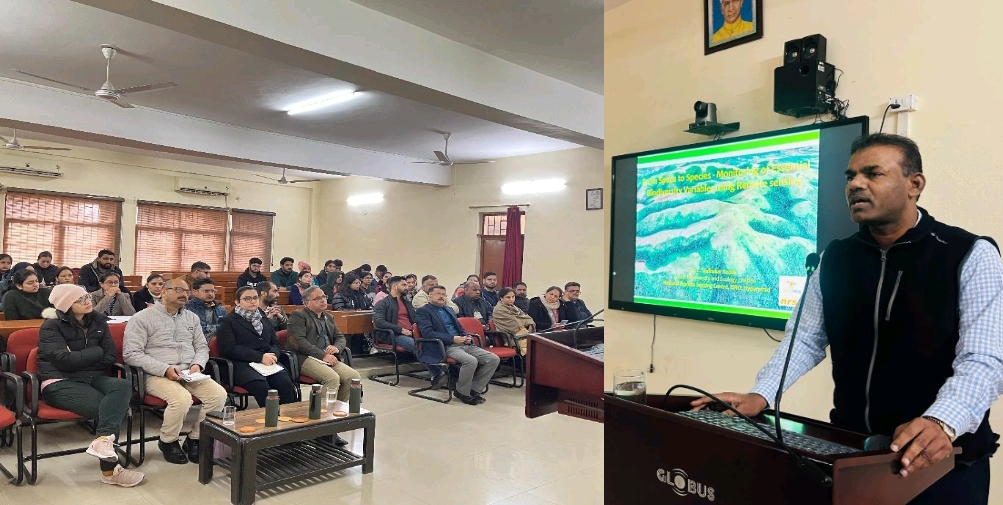About University

Cradled in the lap of mountains at the foothills of auspicious Trikuta, besides the river Tawi at an altitude of 1030 ft. is Jammu. This 'city of temples' has many places...
The Department of Botany, University of Jammu, in collaboration with the J&K Biodiversity Council, organized a special talk titled “From Space to Species: Monitoring of Essential Biodiversity Variables Using Remote Sensing” by Dr. C. Sudhakar Reddy, Head of the Forest Biodiversity and Ecology Division, NRSC, Indian Space Research Organization (ISRO), Hyderabad.
Initiating his insightful and thought-provoking talk, Dr. Reddy outlined the underlying causes of biodiversity loss, its far-reaching implications, and the various measures being undertaken to address these challenges. Focusing on the concept of Essential Biodiversity Variables (EBVs), Dr. Reddy elaborated on Remote Sensing-based methodologies such as Spectral Reflectance Patterns, which are instrumental in measuring ecological biodiversity, forest types, land cover, long-term forest cover changes, global tree cover loss, leaf area index, and forest fragmentation citing some specific examples from India and globe. He also detailed the application of remote sensing approaches for biomass estimation and discussed their utility in addressing critical biodiversity threats, including forest fires, invasive alien species, and the shrinkage or loss of water bodies. Additionally, he emphasized the role of remote sensing in mapping the global spatial distribution of endemic and threatened species and predicting their suitable habitats. Conveying his gratitude to the University of Jammu, Dr. Reddy desired he seeks to have meaningful collaborations with the Universities and research organizations in Jammu & Kashmir, and Ladakh for gathering essential information for the monitoring of EBVs at scales relevant to research and decision-making for conservation. The lecture concluded with an engaging question-answer session, where Dr. Reddy addressed queries from researchers and scholars in the audience.
Earlier, Prof Yash Pal Sharma Faculty of Life Sciences, University of Jammu and Member, J&K Biodiversity Council extended a formal welcome to the learned scientist from ISRO, Hyderabad and introduced him to the audience highlighting his remarkable achievements and extensive research contributions. Prof Sharma informed that since species abundances and distributions are changing quickly, globally, it is imperative to gather trustworthy, comprehensive information for directing and evaluating activities and policies meant to manage and maintain the various benefits and functions of species and how the AI-driven tools and remote sensing can be employed to resolve some of the present challenges of biodiversity monitoring and conservation.
While Dr. Skarma Nonzom conducted the proceedings of the event, a formal a vote of thanks was proposed by Dr. Harish Dutt. The event was attended by the officials of the J&K Biodiversity Council, Forest Research Institute, Jammu, Faculty of Life Sciences including Prof. Veenu Kaul, Dr. Neeraj Sharma (Bhaderwah Campus), Ms. Harpreet Kour, Mr Rakesh Abrol, Dinesh Singh, Dr. Amit Gupta, Dr. Ripu Daman, Dr. Shash Pal (Department of Zoology, University of Jammu), Dr. Abhishek Dutta, Dr. Komal Verma, research scholars and students of the Department of Botany, University of Jammu.
